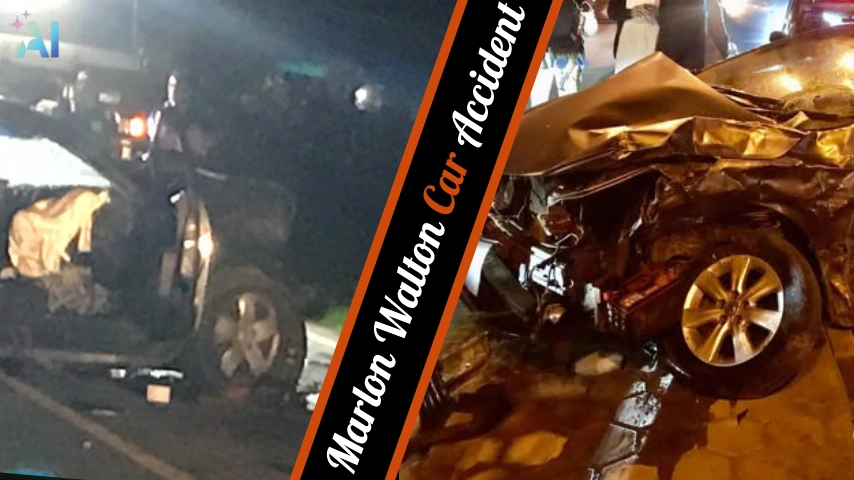Marlon Walton car accident has been a topic of concern and speculation recently. But what really happened? And why is it important to talk about? Let’s dive into the details and explore the impact of this incident on road safety awareness.
Car accidents can happen to anyone, anywhere, at any time. They’re scary, sudden, and often life-changing. The Marlon Walton car accident is no exception. It’s a stark reminder of how quickly things can go wrong on the road. And it’s got people talking about ways to make our streets safer for everyone.
The Incident
So, what exactly happened in the Marlon Walton car accident? Well, that’s where things get a bit tricky. Despite our best efforts to find specific information about this incident, the details remain unclear. There’s no concrete evidence or reports directly linking Marlon Walton to a particular car accident.
But don’t worry! This lack of specific information doesn’t mean we can’t learn something valuable. Instead, let’s use this as a chance to talk about car safety in general. After all, every accident, whether it involves a celebrity or not, is a chance for us to think about how we can be safer on the roads.
The Importance of Road Safety
Car accidents are a big deal. They happen more often than we’d like to think. In fact, they’re one of the leading causes of injury and death worldwide. That’s pretty scary, right?
But here’s the good news: many accidents can be prevented. How? By following some simple safety rules and being more aware when we’re on the road. Let’s break it down:
- Always wear your seatbelt
- Don’t drink and drive
- Avoid distractions like texting while driving
- Follow the speed limit
- Keep your car in good condition
These might seem like no-brainers, but you’d be surprised how many people forget these basic rules. And sometimes, that forgetfulness can lead to serious consequences.
Learning from Other Accidents
While we don’t have specific details about the Marlon Walton car accident, we can learn from other incidents. Let’s look at a few examples:
- In April 2013, a Birmingham City striker named Marlon King was arrested after a three-car accident. He was suspected of dangerous driving. This shows how even professional athletes can make mistakes on the road.
- In January 2024, a man named Stuart Marshall died in an accident. The coroner ruled it as “death by accident or misadventure”. This reminds us that accidents can happen to anyone, anytime.
- In April 1991, a Georgia State Trooper named James Keith Stewart died in a one-car accident while on duty. He was trying to avoid a horse on the road. This tragic incident shows how unexpected obstacles can lead to serious accidents.
These stories, while sad, teach us important lessons about road safety. They remind us to always be alert, follow traffic rules, and expect the unexpected when we’re driving.
The Impact of Car Accidents
Car accidents don’t just affect the people directly involved. They can have a ripple effect on families, communities, and even entire cities. Let’s think about some of the ways a car accident can impact people:
- Physical injuries: From minor cuts to life-changing disabilities
- Emotional trauma: Accidents can leave lasting psychological scars
- Financial burden: Medical bills, car repairs, and lost wages can add up quickly
- Legal consequences: Some accidents lead to lawsuits or criminal charges
- Community impact: Serious accidents can affect traffic patterns and local policies
It’s clear that the effects of a car accident can be far-reaching and long-lasting. That’s why it’s so important to do everything we can to prevent them.
Preventing Car Accidents
So, how can we stop car accidents from happening? While we can’t prevent every single accident, there are lots of things we can do to make our roads safer. Here are some ideas:
- Better driver education: Teaching new drivers about the risks and responsibilities of driving
- Stricter enforcement of traffic laws: Making sure people follow the rules of the road
- Improved road design: Creating safer intersections and clearer road signs
- Advanced car safety features: Things like automatic braking and lane departure warnings
- Public awareness campaigns: Reminding people about the importance of safe driving
These strategies can help reduce the number of accidents on our roads. But remember, the most important factor in road safety is you, the driver. Your choices and actions behind the wheel can make a big difference.
What to Do If You’re in an Accident
Even if we’re super careful, accidents can still happen. So it’s good to know what to do if you find yourself in one. Here’s a quick checklist:
- Stay calm and check for injuries
- Call for help (police and ambulance if needed)
- Move to a safe spot if possible
- Exchange information with the other driver(s)
- Take photos of the accident scene
- Don’t admit fault or discuss the accident details
- Contact your insurance company
Remember, your safety is the most important thing. Everything else can be sorted out later.
The Role of Technology in Road Safety
Technology is changing the way we drive, and it’s making our roads safer too. Here are some cool tech innovations that are helping prevent accidents:
- Autonomous emergency braking: Your car can stop itself if it detects a potential collision
- Lane departure warnings: Alerts you if you’re drifting out of your lane
- Blind spot detection: Lets you know if there’s a car in your blind spot
- Adaptive cruise control: Automatically adjusts your speed to maintain a safe distance from other cars
- Drunk driving prevention systems: Some cars can detect if you’re impaired and prevent you from driving
These technologies are like having an extra set of eyes on the road. They can help catch things we might miss and react faster than we can in dangerous situations.
The Human Factor in Road Safety
While technology is great, it’s important to remember that safe driving ultimately comes down to human behavior. Here are some ways we can all be better drivers:
- Stay focused: Put away your phone and avoid other distractions
- Plan ahead: Give yourself plenty of time to reach your destination
- Stay calm: Road rage can lead to dangerous decisions
- Know your limits: Don’t drive when you’re tired or under the influence
- Be predictable: Use your turn signals and follow traffic rules
By making these habits part of our daily driving routine, we can all contribute to safer roads.
The Future of Road Safety
As we look to the future, there’s a lot to be excited about in terms of road safety. Here are some trends to watch:
- Self-driving cars: These could eliminate human error, a major cause of accidents
- Smart roads: Roads that can communicate with cars to warn of hazards
- Improved public transportation: Reducing the number of cars on the road
- Stricter drunk driving laws: Some countries are considering zero-tolerance policies
- Better urban planning: Designing cities to be more pedestrian and cyclist-friendly
These developments could lead to a future where car accidents are much rarer. But until then, it’s up to all of us to do our part in keeping our roads safe.
Conclusion
While we may not have specific details about the Marlon Walton car accident, this exploration has reminded us of the importance of road safety. Every time we get behind the wheel, we have the power to make choices that keep ourselves and others safe.
Remember, safe driving isn’t just about following rules. It’s about being aware, making good decisions, and looking out for each other. By working together and staying informed, we can all contribute to safer roads for everyone.
So the next time you’re about to start your car, take a moment to think about safety. Buckle up, put away distractions, and be alert. Your actions could save a life – maybe even your own.





